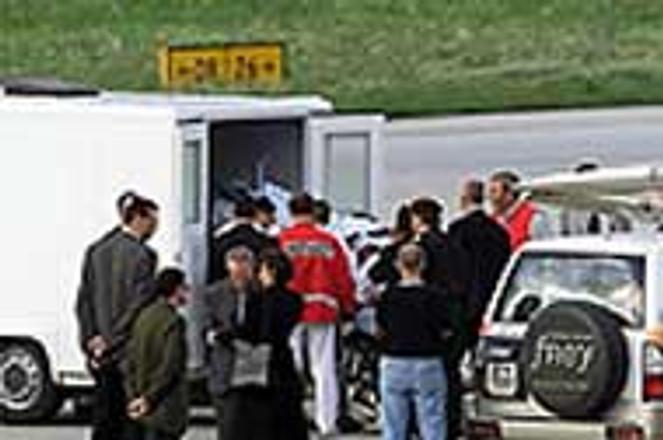Slovak President Rudolf Schuster is loaded into a waiting ambulance after arriving by plane in Innsbruck. The president's condition has been stabilised.photo: TASR
The condition of Slovak President Rudolf Schuster was stabilised last week by doctors at a clinic in Innsbruck, Austria. While the extent of the damage to the president's health had not been determined by press time, Austrian doctors said they might be able pull Schuster out of his induced coma as early as July 7.
In Slovakia, meanwhile, the fallout over the president's near-fatal encounter with pneumonia and a ruptured colon, and the country's inadequate response to it, began to claim its first victims: Health Minister Tibor Šagát resigned on July 4 after bitter criticism of the poor conditions in Slovak hospitals and the inept medical treatment given to Schuster; Ivan Hantak, the director of the Interior Ministry hospital - one of several ill-equipped hospitals Schuster was taxied between while in a coma in mid June - also resigned.
The tardiness of the government in assuming Schuster's powers also led to accusations that both the political and medical establishments had been ill-prepared to handle such a crisis. "The government's response was slow and inadequate," said Grigorij Mesežnikov, president of the Bratislava-based Institute for Public Affairs. "Clearly, no one in the ruling coalition had made any preparations for the possibility that a key politician might become ill."
Resignation
At a press conference on July 4, Prime Minister Mikuláš Dzurinda said that although he did not blame Šagát for the poor medical treatment afforded the president, he appreciated the embattled Health Minister's resignation as a sign that "a higher political culture" was on the rise in Slovakia, according to which ministers took responsibility for failures in their sectors.
"I believe that Minister Šagát made no mistake in the handling of the president's condition, but I appreciate his decision to step down," Dzurinda said. He added that contrary to media speculation, Šagát had not been forced by Dzurinda to leave his post.
Šagát's resignation came in the face of intense public and political reproach. The opposition HZDS and SNS parties, members of the ruling coalition, and Róbert Fico, the head of the country's most popular non-parliamentary party Smer, all called for Šagát to step down. The public was also in favour of the move: according to a Polis agency opinion poll, 40.7% of Slovaks were in favour of the resignation, while 32.9% saw no reason for it.
Analysts, meanwhile, were unable to speculate on who might replace Šagát, but added that his resignation should not endanger the stability of the ruling coalition. Peter Horváth, a political analyst with Trnava University, said that "choosing a new minister won't be an easy task, but such replacements are among the democratic habits which this government will be able to handle."
The resignation came one day after an investigation committee looking into the president's hospitalisation released its findings. The committee, set up by Dzurinda and consisting of eight officials from each of the Interior and Health Ministries, ruled that the head of state had recieved sub-standard care in Slovak hospitals. "Healing procedures weren't optimal, a lack of documentation was found and antibiotics weren't used properly," Dzurinda read.
While Schuster remains hospitalised in Austria, his powers devolved to other government officials on July 3. Under the terms of the constitution, Dzurinda assumed the presidential responsibilities to represent the country abroad, ratify international agreements, command the Slovak armed forces, receive and accredit ambassadors, award decorations and honours, grant pardons and amnesties and appoint judges.
Speaker of parliament Jozef Migaš is now empowered to appoint and remove members of government and other principal officers, university professors and generals. Another key power he inherited was the crucial ability to sign new laws into effect.
But because Migaš did not take the law-signing power until almost three weeks after Schuster first fell ill, two key laws - the Law on Banks, which lays the groundwork for privatisation of the banking sector, and the Law on Export and Import Rules, which defines regulations for goods leaving and entering the country - had to be sent back to parliament unsigned. The laws were passed again by the legislature in a special session July 3, with the added stipulation that the signing deadline be pushed back to July 15, giving Migaš time to fulfill his new duty.
Dramatic illness
Schuster first fell into a coma on June 24, at which time his lungs were not able to function without assistance. With his lungs unable to properly oxygenate his blood, Schuster's vital organs and brain became endangered. According to Jozef Leikert, Schuster's spokesperson, on the night of June 27 his condition deteriorated so severely that a priest was beckoned to the sick president's bedside to deliver his last rites.
Upon request of his family, Schuster was flown in critical condition to Innsbruck the next day, after being invited to do so by Austrian President Thomas Klestil. Since his hospitalisation in Austria, Schuster's condition has improved and stabilised.
According to Austrian doctors, the infection in Schuster's lungs has been brought under control, as have scars on his abdomen from the initial surgery which had become inflamed after being deprived of oxygen.
Schuster's lungs are still weak and must be artificially aided. "Now the respiration rate of his lungs is 3-4 times per minute, while a normal frequency is 15-20 times per minute," said Walter Hasibeder, an anesthesiologist at Innsbruck hospital for the SITA press agency on July 5.
"I hope president Schuster will be able to open his eyes on Friday morning and answer simple questions by nodding his head," Hasibeder added, although he was unable to estimate how long Schuster would have to remain hospitalised in Austria.


